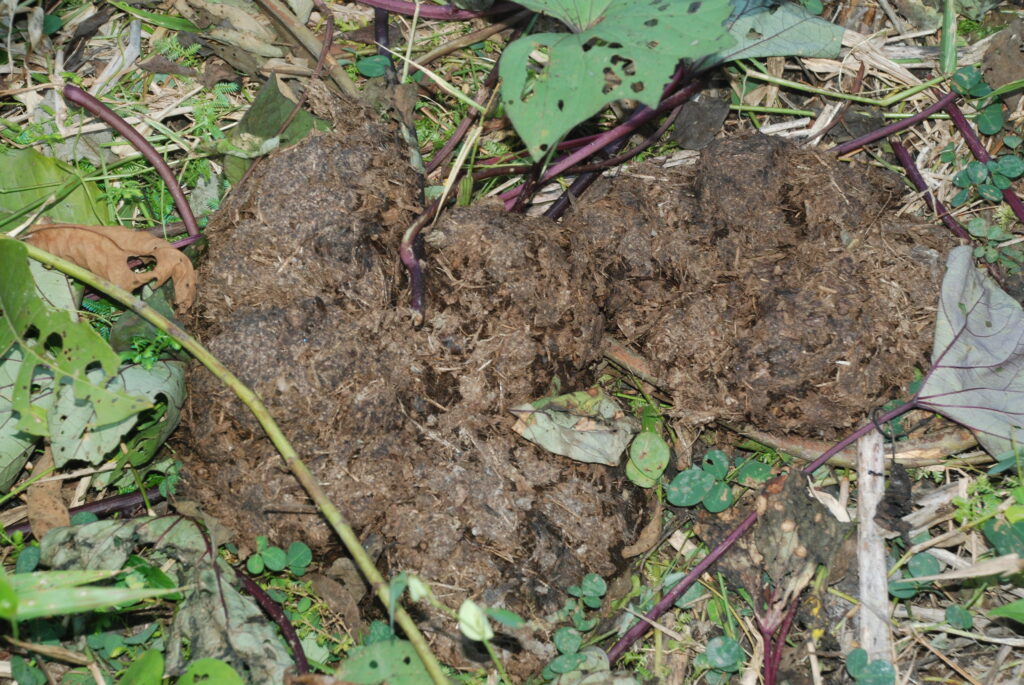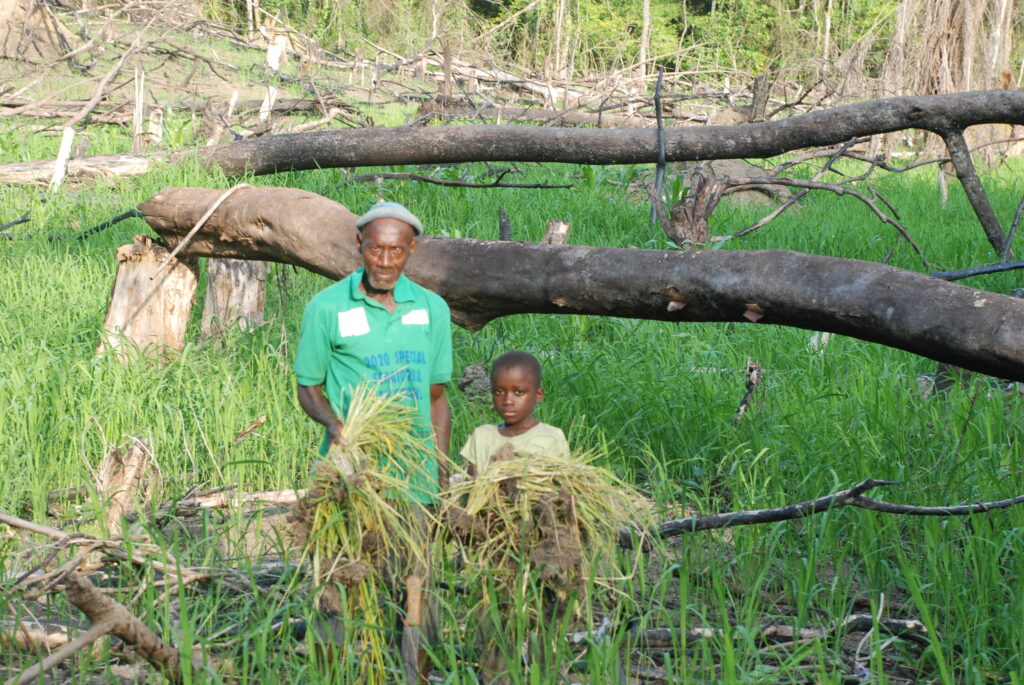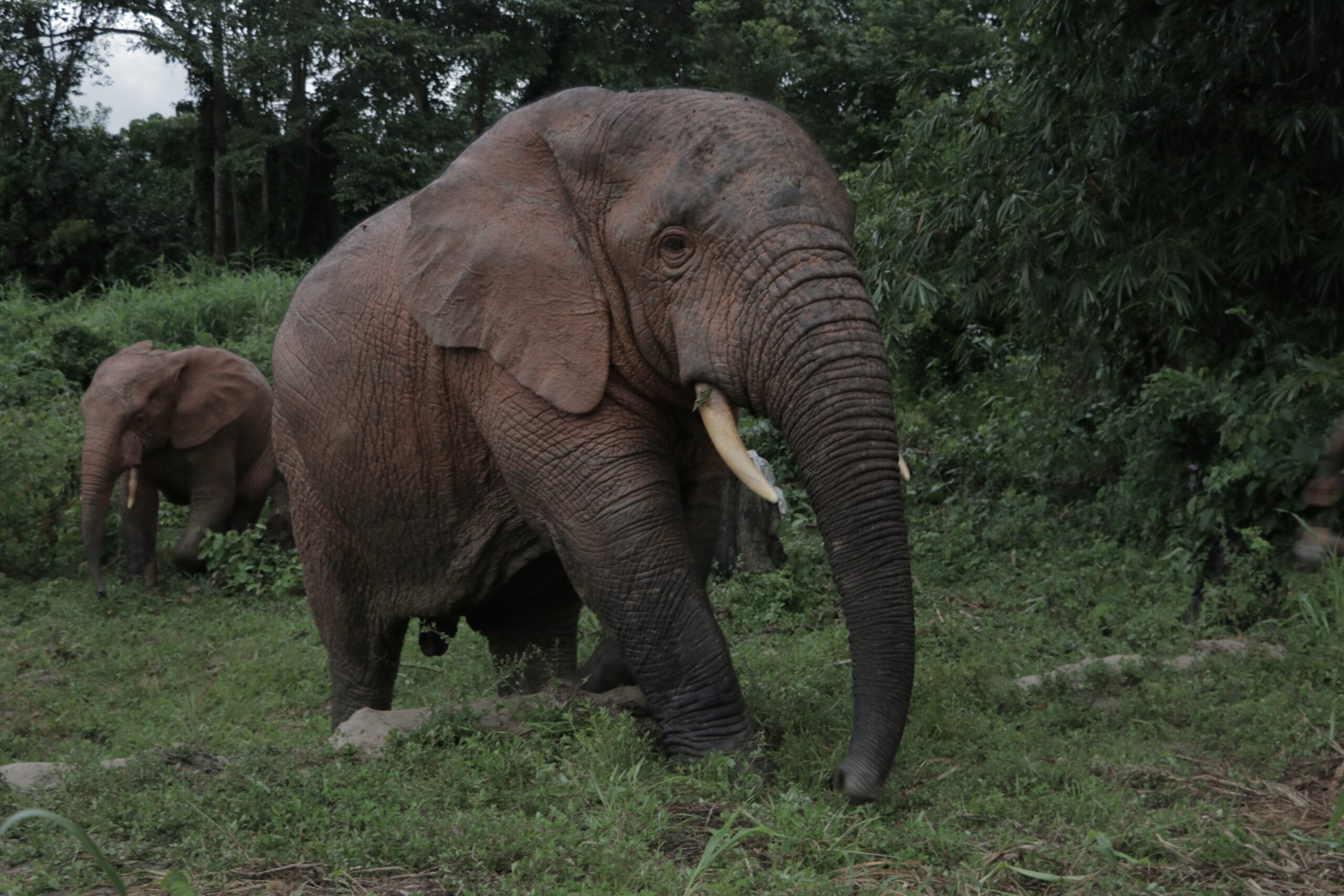Top: A pair of elephants in Grand Gedeh. The DayLight/Harry Browne
By Mark B. Newa
GBARMA, Gbarpolu – In June, Boakai Momo and 14 other members of his family fled the Bongomah village from a herd of elephants.
The elephant had eaten his rice and potato farms, turning the once flush greenery into dirt in one night.
“There is no more safe area to make farm,” Momo tells The DayLight in an interview at his refuge in the town of Zuo. “People want to make farms but when the elephants start coming, they will make things hard for us.”
Momo says more than a hundred people have fled their villages from the invading elephants, something other displaced farmers corroborate. Three of the five clans in Gbarma Chiefdom, according to Paramount Chief Henry Cooper, have been affected. Among the affected villages are Bongomah, Gbengar, Gbarlomehn, Jarjuah, Todeemehn and a place locals call Africa.
All the victims have the same story as Momo’s. An elderly woman named Fatu Lomehn, a widow and mother of 12 children and grandchildren, ran from the Gbarlomehn. Morris Tarweh, a young farmer abandoned the Yarjuah village because the elephants made it “scary.” George Anderson of the Torgboima clan, fled with his family to a new location when the herds damaged eight acres of cassava. Abraham Clarke, a father of six, fled Africa to Daniel village and then to Zuo.
A sanctuary—for now
Zuo might be a sanctuary for the displaced villagers. The largest town in that region, with the bulk of its estimated 1,900 people are farmers. However, it is also not safe from the herds. In fact, they have already begun visiting farms here.
Townspeople in Zuo are worried. Some of them had just finished plowing their farms when elephants ravaged them in late June. A week earlier, the herds had ravaged a farm about a 30-minute walk from Zuo.
The elephants travel from the Bopolu District and cross the Maher River to their communities and back each year, locals say. In the last five years or so, the tuskers have, however, frequented their daily and nightly raids. A trail of footprints and elephant dung is seen on one potato and rice farm. Two farmsteads are abandoned.
“They are getting closer to us now. When they cannot find food there, they will enter on us in this town,” says George Anderson, a farmer. “This is their eating place now.”
Elephants eat according to their bodies. The animals eat up to 169 kilograms (375 pounds) of food daily, according to experts. Fruits, vegetables, grasses, leaves and roots form a big part of their everyday menu.
Experts blame farming, hunting and mining for what they call the human-elephant conflict.
“When the villagers are making farms on the elephants’ tracks, we will see them appearing,” according to Raymond Kpoto of the Society for the Conservation of Nature Liberia (SCNL).


There is an atmosphere of insecurity in Zuo due to the elephant situation. Villagers are afraid to go into the forest, affecting farming and other activities.
Recently, one farmer who had gone to harvest palm fruit sat in the tree for nearly six hours, Clarke tells me in a phone interview.
Motorcycle taxi drivers are afraid to ply the routes for fear of encountering the animals, with few plying the routes, according to villagers.
This has led to a surge in the costs of rice, gasoline and transportation, locals say.
No Compensation
Villagers say they have used other means to cope but all seem not to work. They clang pots, blow horns and burn pepper. Some have even installed solar lamps on farms but not enough to drive away their unwelcome tusked guests.
In the first quarter of this year, the Elephant Research and Conservation (ELRECO), a German NGO, successfully tested a device with the sound of honeybees. In the video posted to the NGO’s website, an elephant is seen walking away after hearing the buzzing sound of honeybees from BuzzBox. However, villagers in the region say they have no idea about the technology.
Satta Mambu, an influential woman in Zuo, urges the government to set up a program to help them repel elephants.
“When the government [does] not come in, in the next four to five years, the elephants will drive us from here,” Clarke says.
There is no compensation for villagers who have lost farms to elephants, according to Saah David, national coordinator of REDD+ at the Forestry Development Authority (FDA). REDD+ means Reducing Emissions from Deforestation and Forest Degradation.
Melvin Goeh, a ranger at FDA’s checkpoint in Sawmill, says his unit is not aware of the elephant situation in the region. Sawmill is less than 10 kilometers away from Zuo.
Alfred Bai Commissioner of Gbarma District, says his office is not aware of any elephant situation. He promises to follow up on the matter.
Funding for this story was provided by Wild Philanthropy with the support of the Elephant Protection Initiative Foundation (EPI). The DayLight maintained complete editorial independence over the story’s content.





Facebook Comments